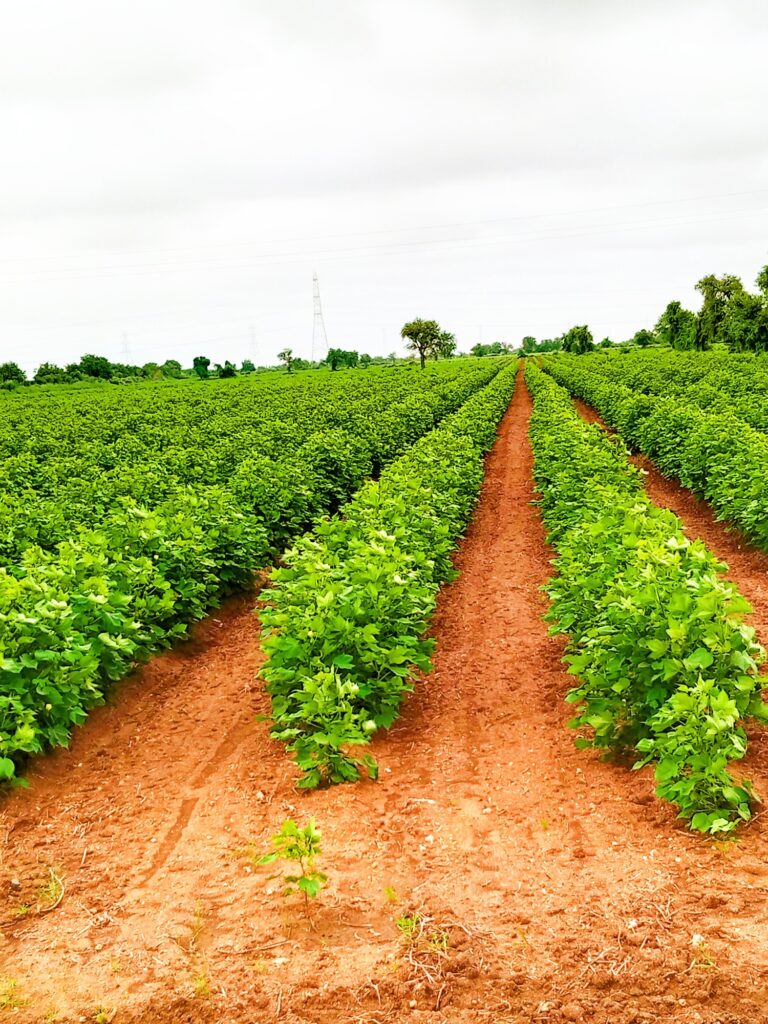MARI has seamlessly aligned itself with the Better Cotton Project by integrating sustainable farming practices, community empowerment, and climate resilience into its execution strategy. Through the establishment of four Production Units (PUs), MARI has directly engaged with 16,000 cotton farmers and 24,000 farm workers, ensuring widespread adoption of Better Cotton Principles & Criteria. Special attention has been given to gender inclusion, with 25% of farmers and 75% of farm workers being women, promoting equal participation in decision-making and livelihood enhancement.
To support climate-smart agriculture, MARI has partnered with Regional Agriculture Research Stations (RARS) and Krishi Vigyan Kendra (KVKs), equipping farmers with knowledge and tools to reduce pesticide use, improve soil health, and increase climate resilience. Additionally, MARI has built strong institutional collaborations with the Department of Handlooms & Textiles – Government of Andhra Pradesh, AP Textiles Cotton Association, and other value chain partners, facilitating access to government schemes and market linkages.
The project’s reach spans 86 villages across four mandals, with a majority of farmers practicing dryland agriculture, making sustainable interventions even more crucial. By fostering knowledge-sharing through Village Knowledge Centers, MARI ensures that farmers receive continuous technical and financial guidance.
Through these efforts, MARI is driving long-term transformation in Andhra Pradesh’s cotton farming sector, making it more profitable, resilient, and environmentally sustainable, while directly contributing to Better Cotton’s 2030 impact targets.
Objectives
MARI aims to work closely with small and marginal cotton farmers, farm workers, and the farm community to understand deep-rooted issues and develop sustainable solutions for a better farm community through the intervention of Better Cotton Principles & Criteria. Better Cotton has identified five impact targets to be achieved by 2030, which serve as primary objectives for every Better Cotton partner. These target areas include:
- Smallholder Livelihoods: Sustainably increase the net income and resilience of two million cotton farmers and workers.
- Soil Health: Ensure 100% of Better Cotton Farmers have improved the health of their soil.
- Women Empowerment: Reach one million women in cotton with programs and resources that promote equal farm decision-making, build climate resilience, or support improved livelihoods. Ensure that 25% of field staff are women with the power to influence sustainable cotton production.
- Pesticides: Reduce the use and risk of synthetic pesticides applied by Better Cotton Farmers and workers by at least 50%.
- Climate Change Mitigation: Reduce greenhouse gas emissions by 50% per ton of Better Cotton lint produced by the end of the decade.

"Empowering cotton farmers with sustainable practices, equitable opportunities, and climate resilience, MARI fosters a future where agriculture thrives in harmony with people and the planet."
Achievements
- Operational Activity: The team, infrastructure, and project beneficiaries have been operationally active for about a year.
- Production Units: Four Production Units (PUs) have been established, each comprising 4,000 farmers. Village-level awareness programs, demonstration units, and training sessions have been completed, resulting in a strong presence and recognition among the farm community.
- Partnerships and Collaborations: The Better Cotton project in Andhra Pradesh has developed strong relationships with the Department of Handlooms & Textiles – Government of Andhra Pradesh, AP Textiles Cotton Association, and other value chain partners. These relationships will aid in scaling the project and converging with government schemes.
- Technical Support: MARI has established technical collaborations with the Regional Agriculture Research Station (RARS) and Krishi Vigyan Kendra (KVKs) to support the team and farmers across all four PUs.
This comprehensive approach ensures the sustainable development of the cotton farming community, aligning with Better Cotton’s impact targets and promoting overall agricultural and social well-being.

Project Outreach
- 16000 cotton farmers with about 25% women farmers
- 24000 farm workers with about 75% female workers
- 60000 acres
- 4 mandals
- 86 villages
- 95% dry land farmers
- 1 State – Andhra Pradesh
“The Better Cotton project, driven by MARI’s commitment to sustainability and social equity, has empowered thousands of farmers with knowledge, resources, and market linkages. By integrating sustainable farming practices, enhancing women’s participation, and reducing environmental impact, MARI continues to build a resilient cotton farming community that thrives today and for generations to come.”
- Project Duration
2023-2025
- Supported By
Better Cotton - Growth & Innovation Fund
- Operational Area
Hyderabad
- Causes
